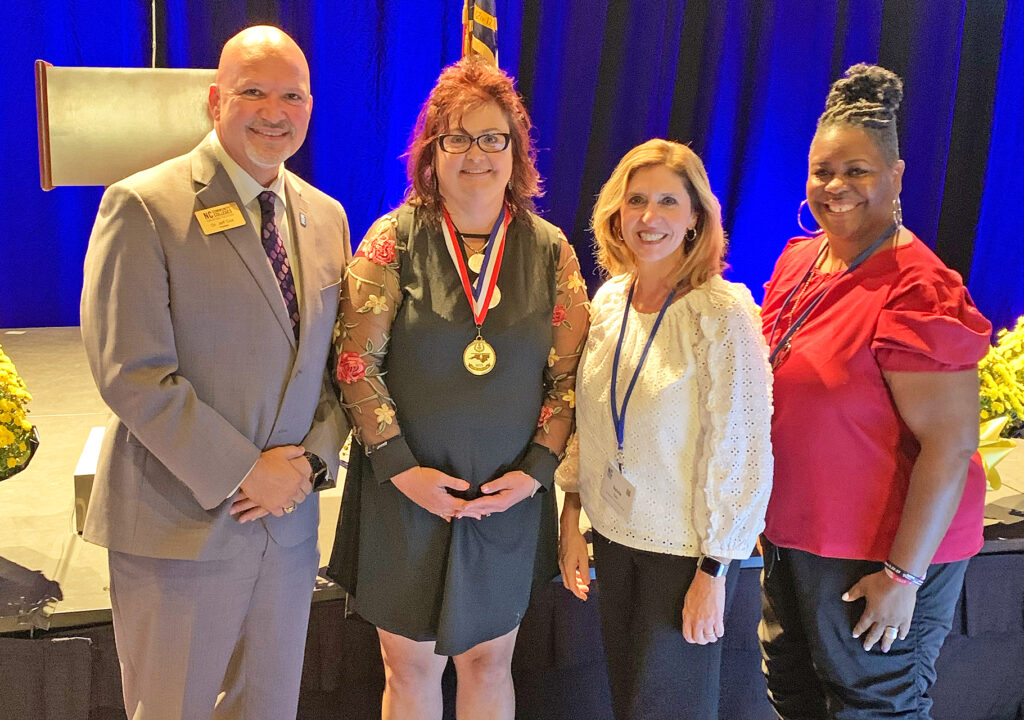Eaker awarded master instructor medallion at community college system conference
Transitional Studies Instructor Angela Eaker was one of 20 candidates selected to participate in the inaugural North Carolina Community College System Master Instructor Certification Program from Feb. 2 through May 21. Her efforts were recognized with a medallion awarded at the NCCCS Conference in Raleigh on Oct. 13.
“We are extremely proud of Angela,” said Veronica Powell, Director of Transitional Studies. “She was in the inaugural cohort of the program, and she is the only Master Instructor here at Southeastern Community College. Angela was the only one within our neighboring counties to be selected to participate.”
The NCCCS Master Instructor Certification Program “is designed to elevate the professional expertise of our state’s most dedicated educators,” according to the program’s website. Eaker is a Transitional Studies Instructor with 17 years of teaching experience in college and secondary education. Students earn their high school equivalency diploma through the Transitional Studies program at SCC.
“I was very excited because a lot of my hard work and dedication paid off when I received my medallion at the system conference,” Eaker said. “I possess a track record of developing and leading progressive courses and programs designed to enhance the learning experience. These deliver outcomes that meet and surpass the expectations of our students.”
Eaker explained that those enrolled in the master instructor program will undergo intensive professional learning to deepen their expertise in implementing teaching and learning best practices.
“The curriculum encourages extensive networking and collaboration, enabling participants to both practice and model these best practices,” Eaker said. “The course is designed to be applicable to both traditional and virtual classrooms, ensuring its relevance in today’s diverse educational landscape.”
SCC Executive Vice President Dr. Sylvia Cox said that Eaker’s achievement was a competitive process and high honor among the 58 N.C. community colleges. Cox witnessed Eaker accepting her medallion at the system conference and was reminded of her love of teaching.
“If we’re going to be able to teach well, we have to go back and create these professional learning communities,” Cox said. “We must learn what new techniques and innovations are happening in education. For Angela going through this program, the benefits to her classroom were significant.”
Pioneering the first cohort of master instructors, Cox said that Eaker was a model and leader for other instructors to aspire to. She said that Eaker’s example would inspire other instructors to follow in her footsteps.
“I went through the program to become a better instructor for my students and learn more strategies that could help me improve my teaching skills,” Eaker said. “The more you are educated as an instructor, the better results you will have to improve the success of your students.”
A typical day for Eaker at SCC starts with lesson plan review, material preparation and resource organization before classes start. Eaker’s classes cover foundational skills in writing, math and study strategies with lectures, discussions and hands-on activities. Eaker provides one on one support for students who need extra help through tutoring, answering questions and helping students set academic goals.
“I assess student progress through quizzes, tests and assignments while providing feedback to help students improve,” Eaker said. “I may spend time developing or updating curriculum to ensure that it meets the needs of students and aligns with academic standards.”
Eaker explained that collaboration is common practice in working with other faculty and staff to discuss students’ progress, share resources and develop programs that support student success. Other duties include attending workshops and training sessions to stay updated on educational strategies and policies.
“My favorite part of my job is helping my students reach their goals so they can move on to a career of their choice,” Eaker said. “It warms my heart to see each student with everyday struggles work to achieve something they didn’t think they could. I love and support all my students.”
Eaker’s administrative duties include completing paperwork, grading assignments and documenting student progress. Her community engagement efforts help promote the Transitional Studies program and help recruit new students seeking to earn their high school equivalency diploma.
“Overall, the role of a Transitional Studies Instructor is dynamic and focuses on helping students successfully transition to higher education or workforce training,” Eaker said.
For more information about the Transitional Studies program, formally known as Basic Skills Program, send your questions to [email protected] or call 910-788-6326.

